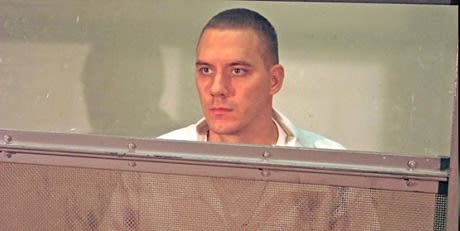Into the Abyss is, in a sense, two movies; it's simultaneously a true-crime documentary and a meditative examination on capital punishment. Like the best of Werner Herzog's work, both fiction and documentary, we get not only a compelling narrative rife with interesting, nuanced characters, but also an exploration of a larger, more abstract concept. Trying to reconcile the two is what makes films like Into the Abyss frustrating, but honest.
Michael Perry is eight days away from execution when he sits down to talk to Herzog. Convicted of a triple-homicide ten years ago, Herzog flatly tells Perry: "I don't have to like you, but I respect you. You're a human being and I do not believe that human beings should be executed." While other directors may have then launched into a polemic on the evils of capital punishment, Herzog traces the roots of the story. We see crime scene footage, interviews with the families of the victims and members of the community.
While it's a highly politicized issue, Herzog rightly focuses on the humanity of the story, and even the seemingly extraneous details fascinate him – at one point, when an acquaintance of Perry's is describing how he didn't read about the murders because he couldn't read, Herzog interrupts him to ask: "what is it like not to be able to read?" Or when Perry's accomplice's father, also in prison, remarks that his son won't be released until 1941, Herzog softly corrects him that it's 2041, adding: "I guess time moves differently for you in here."
This is a fairly restrained outing for Herzog – Werner himself is only heard occasionally in the interviews, never seen onscreen – and the interviewees are all afforded a great deal of respect, even if it means allowing them to convey their feelings at the expense of the pace of the film.
Due to its stylistic modesty, Into the Abyss may not initially seem quite as significant as some of Herzog's other work, but there is a potency to it that won't easily be forgotten.
(Mongrel Media)Michael Perry is eight days away from execution when he sits down to talk to Herzog. Convicted of a triple-homicide ten years ago, Herzog flatly tells Perry: "I don't have to like you, but I respect you. You're a human being and I do not believe that human beings should be executed." While other directors may have then launched into a polemic on the evils of capital punishment, Herzog traces the roots of the story. We see crime scene footage, interviews with the families of the victims and members of the community.
While it's a highly politicized issue, Herzog rightly focuses on the humanity of the story, and even the seemingly extraneous details fascinate him – at one point, when an acquaintance of Perry's is describing how he didn't read about the murders because he couldn't read, Herzog interrupts him to ask: "what is it like not to be able to read?" Or when Perry's accomplice's father, also in prison, remarks that his son won't be released until 1941, Herzog softly corrects him that it's 2041, adding: "I guess time moves differently for you in here."
This is a fairly restrained outing for Herzog – Werner himself is only heard occasionally in the interviews, never seen onscreen – and the interviewees are all afforded a great deal of respect, even if it means allowing them to convey their feelings at the expense of the pace of the film.
Due to its stylistic modesty, Into the Abyss may not initially seem quite as significant as some of Herzog's other work, but there is a potency to it that won't easily be forgotten.
